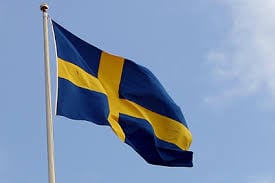Nigerians filed over 7,646 asylum applications in Sweden between 2000 and 2024, according to official figures from the Swedish Migration Agency, Migrationsverket.
Data obtained by Saturday PUNCH from the agency’s portal, covering the period, showed a consistent stream of Nigerian asylum seekers in the Nordic country.
A total of 6,783 asylum applications from Nigerian nationals were recorded between 2000 and 2021.
In 2022, there were 288 applications, followed by 200 in 2023, and 375 in 2024. Of the 375 applications received in 2024, 239 were first-time claims, while 136 were follow-up “extension” requests from persons whose temporary status was about to expire.
Women filed nearly two-thirds (159) of all first-time Nigerian claims, and half of every Nigerian applicant was between 25 and 44 years old, as no one over 64 applied in 2024.
Children accompanied 60 adult applicants, while one child travelled alone and registered as an unaccompanied minor.
Similarly, in 2023, there were 160 adults, 39 children in families, and one unaccompanied child among first-time asylum seekers from Nigeria.
Over the longer period from 2000 to 2021, a total of 132 unaccompanied minors from Nigeria applied for asylum.
The number of new applications for international protection peaked in 2003 at 452 and again in 2013 at 601, but the volume has never reached the scale of applications seen from countries experiencing internal conflicts.
Across Africa, Nigeria is among the top five countries of origin for asylum seekers in Sweden.
However, Somalia, Eritrea, Sudan, and Ethiopia far surpass it in numbers due to ongoing conflict and instability.
Somalia alone accounted for more than 54,128 applications since 2000, followed by Eritrea with over 39,000, then Sudan, Libya, Morocco, and the Democratic Republic of the Congo.
Other countries include Uganda, Egypt, Cameroon, The Gambia and Burundi, Kenya, Algeria, Tunisia, Rwanda, Tanzania, Ghana, Guinea, Sierra Leone, Mali, Zambia, Djibouti, Côte d’Ivoire, Angola, Zimbabwe, Burkina Faso, and single-digit applications from Benin, Niger, Equatorial Guinea, the Central African Republic and Mauritania. Nigeria, however, remains West Africa’s largest contributor of asylum seekers.
According to the reports, the migration from these countries is often directly tied to large-scale conflict and instability, a factor that distinguishes them from the lower, more consistent flow of applicants from Nigeria.
Swedish authorities say the distinction is significant as it enables a fast-track process for nationalities with historically high rejection rates, defined as a rejection percentage of 85 per cent or higher.
In 2024, Nigerian asylum seekers had an 88 per cent rejection rate while Colombians had 99 per cent.
Globally, the highest asylum grants in Sweden went to nationals of Syria, Afghanistan, Eritrea, Somalia, Iraq, Iran, Ethiopia, Palestine, Ukraine, and stateless persons.
On the other hand, the highest denials were recorded among applicants from Nigeria, India, Bangladesh, Albania, Georgia, Mongolia, Russia, Morocco, Algeria, and Tunisia.
The Swedish government says it prioritises claims linked to war, persecution, or statelessness over applications driven by economic factors.
Sweden’s asylum regime is rooted in the Aliens Act (Utlänningslagen), which incorporates both EU asylum directives and the 1951 UN Refugee Convention.
A successful applicant must demonstrate either refugee status (fear of persecution), eligibility for subsidiary protection (risk of serious harm in war or conflict), or humanitarian grounds such as severe illness or family reunification.
In recent years, however, Sweden has shifted toward more restrictive policies.
Since 2022, it has issued more temporary residence permits, limited family reunification programmes and tightened deportation enforcement.
Following the record influx of asylum claims in 2015, the Swedish parliament introduced a temporary emergency law that curtailed family reunification rights and made almost all new permits temporary. The main features were ratified in July 2021.
Under its 2023 Tidö Agreement, the current centre-right coalition, bolstered by the far-right Sweden Democrats, imposed “the EU’s minimum level” of protection, which uses tougher naturalisation and welfare rules as explicit deterrents.
To be granted asylum in Sweden today, an applicant must clear at least one of the classic Geneva or EU thresholds—fear of persecution, risk of torture or death, or indiscriminate violence—or demonstrate “exceptionally distressing” humanitarian circumstances.
Meanwhile, Abuja-based development economist Dr Aliyu Ilias, reasoned that the exit of more Nigerians and their permanent settlement abroad meant a loss of skilled labour for the country.
He said that with Nigerians battling economic headwinds and deteriorating security at home, the asylum route, however uncertain, still appeared to offer a better prospect.
“So, it is a total brain drain in the long run, and for the economy, it is reducing our GDP. The appalling part is that most of our Nigerian brothers and sisters who go out do not return,” he added.
-Advertisement-
Grab our latest Magazine, "Chief Wole Olanipekun, CFR, SAN, A man of wide horizons and deep intentions". Get your order fast and stress free.
For more details about Newswire Law&Events Magazine, kindly reach out to us on 08039218044, 09070309355. Email: newswiremagazine@yahoo.co.uk. You will be glad you did
Download E-MagazineDo you want to be heard, your events covered, your articles published, or need to advertise your products and services on our Blog and Magazine, reach out to us at Newswire Law and Events, you will be glad you did. For more details about our services, please call: 08039218044, 09070309355. Email: newswiremagazine@yahoo.co.uk








